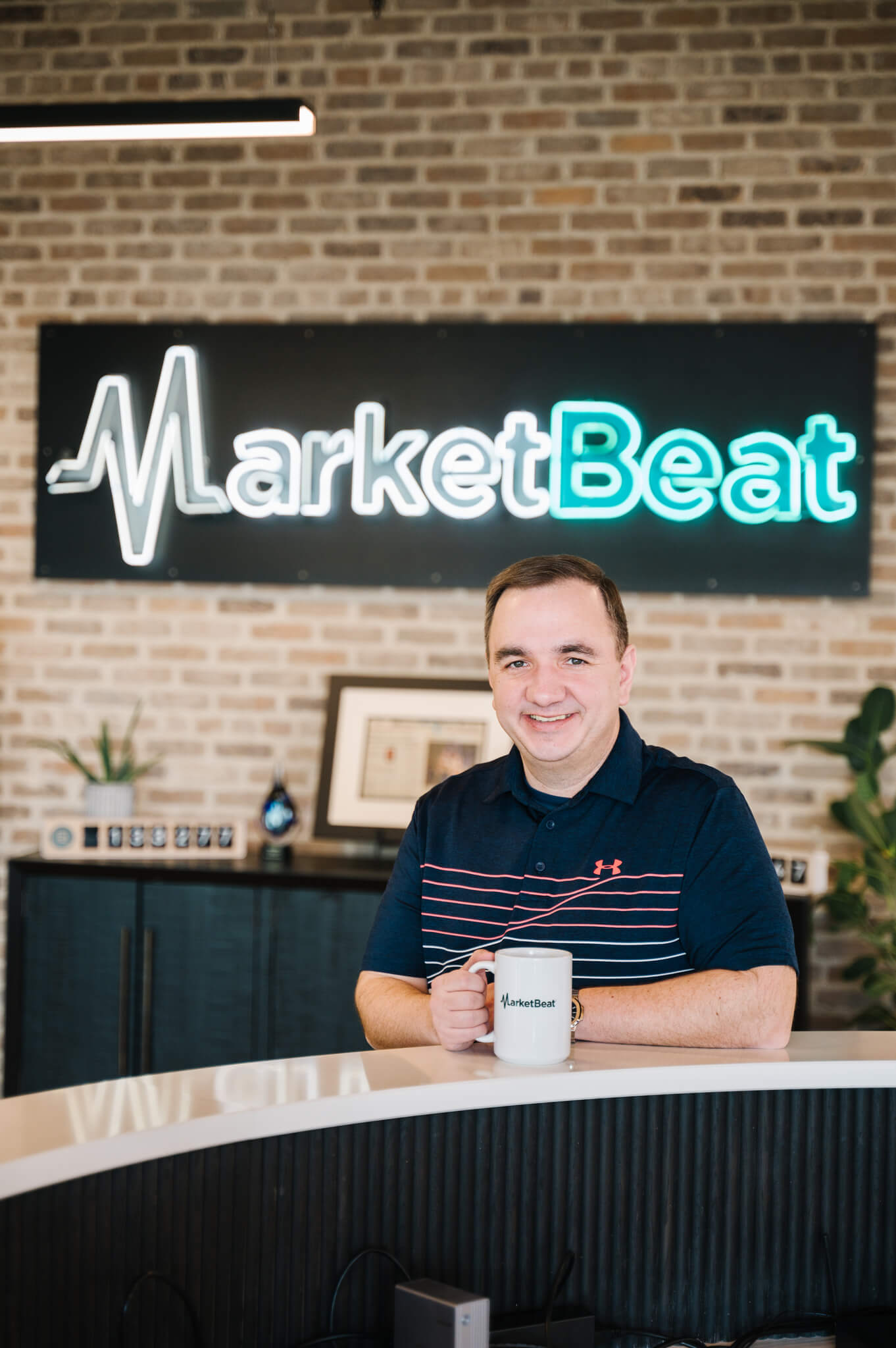 Hi, my name is Matt. I believe that entrepreneurship is the best way to achieve financial prosperity, gain more personal freedom, and fund charitable efforts across the globe. I’m on a mission to teach others to leverage the power of entrepreneurship in their lives and in their communities through my books, my private equity investments, and my community-building efforts.
Hi, my name is Matt. I believe that entrepreneurship is the best way to achieve financial prosperity, gain more personal freedom, and fund charitable efforts across the globe. I’m on a mission to teach others to leverage the power of entrepreneurship in their lives and in their communities through my books, my private equity investments, and my community-building efforts.
The Beginning
My entrepreneurial story began in the fourth grade. The year was 1995. My parents brought home a Packard Bell computer that featured a blazing-fast 133 MHZ Pentium processor, a whopping 16 megabytes of memory, and a brilliant 14” CRT monitor. They also signed us up for Sunrise Net, the local internet service provider that gave us 20 hours per month of dial-up internet access. We got our first family computer, and it opened my eyes to a world of possibilities.
I quickly became enamored with online games, discussion forums, and building websites. Sim City 2000, Sim Copter, Sim Tower, and other simulation games produced by Maxis were my jam. I built a fan website for my favorite games called The Sim Web that offered cheat codes, saved games, screenshots, and utilities. Within a year it was getting a few hundred pageviews each day. I then learned you could make money by putting banner ads on your website. I signed up with an advertising network and my little website started to make $25.00 to $50.00 per month in advertising revenue by promoting free web hosting accounts. When the first check arrived, I realized that you could make money on the internet, and I was hooked.
Entrepreneurship Out of Necessity
Fast forward a few years to 2004, and I am now a freshman at Dakota State University studying computer science. With limited employment opportunities available, I took on a part-time job at McDonalds to help cover my tuition costs. It was not an enjoyable experience. The following year I was determined to do just about anything but work fast food, so I picked up a job at the college newspaper and figured out that I had a knack for writing. I parlayed that experience into becoming a freelance writer and found work online through the ProBlogger job board. After getting the hang of it, I was able to eke out $1,000 to $2,000 per month in income from writing online about personal finance topics. It wasn’t much, but it was enough to pay the bills and graduate from college debt free.
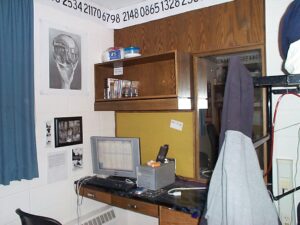 After a year of freelance writing, I launched a personal finance blog called American Consumer News that taught people how to get out of debt, save more money, and build long-term wealth. The site attracted an audience by cross-promoting other personal finance blogs and through social bookmarking websites like Digg, StumbleUpon, and Reddit. It made money by, as you might expect, getting people to click on banner ads. My personal finance blog went so well that it made $75,000 during the year that I graduated college.
After a year of freelance writing, I launched a personal finance blog called American Consumer News that taught people how to get out of debt, save more money, and build long-term wealth. The site attracted an audience by cross-promoting other personal finance blogs and through social bookmarking websites like Digg, StumbleUpon, and Reddit. It made money by, as you might expect, getting people to click on banner ads. My personal finance blog went so well that it made $75,000 during the year that I graduated college.
I didn’t have the confidence to go all in on my internet business, so I pursued a master’s degree at Dakota State, taught web programming classes for the university, and did part-time work for a local web design firm. I also experimented with several other internet businesses, including an audiobook directory, a press release distribution service, a fundraising platform for animal welfare groups (GoGo Photo Contest), other personal finance websites, and a tech news website. However, nothing ever seemed to stick in the same way that American Consumer News did.
From American Consumer News to MarketBeat
In 2011, there was a major shake-up to Google’s algorithm called the “Panda Update” and personal finance websites like mine took a major hit. Half of my website traffic disappeared overnight, and I needed a new plan. There was one shining star remaining in my Google Analytics account, and that was a website called American Banking and Market News that did not rely on Google traffic in the traditional sense. It was a website that featured news about the stock market and it received website traffic from Google Finance, MSN Money, Yahoo Finance, and other online finance portals. Our writers would write articles about big companies like Apple and Bank of America and those portals would feature our content on their company profile pages. People would then clickthrough to our website, read our articles, and some of them would make us money, by, as you might expect, clicking on banner ads.
American Banking and Market News was doing great, but it suffered from major platform risk. It would only continue to generate revenue if Google, Yahoo, and Microsoft kept sending traffic to the website. I never again wanted to be in a position where a tech company could make a big part of my business disappear. The solution was to diversify our traffic acquisition channels and to build our own content distribution network. Initially, this meant launching an email newsletter called ABMN Daily so that we could let our subscribers know when we published new content. Over time, we launched additional distribution channels including a mobile app, text messages, browser notifications, social media accounts, a YouTube channel, and our own financial news portal – MarketBeat.com.
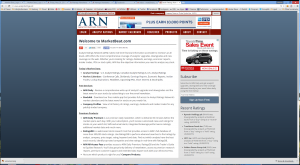 MarketBeat proper started out as a website called Analyst Ratings Network in early 2012. The idea was to create a central hub that our other websites and acquisition channels would funnel traffic to. That site would be the home for our email newsletters and subscription products that we sold to our email subscribers. Soon after, we launched a premium newsletter called MarketBeat Daily Premium and a software subscription offering called RatingsDB (now called MarketBeat All Access). However, we wouldn’t have the MarketBeat brand name until a few years down the road.
MarketBeat proper started out as a website called Analyst Ratings Network in early 2012. The idea was to create a central hub that our other websites and acquisition channels would funnel traffic to. That site would be the home for our email newsletters and subscription products that we sold to our email subscribers. Soon after, we launched a premium newsletter called MarketBeat Daily Premium and a software subscription offering called RatingsDB (now called MarketBeat All Access). However, we wouldn’t have the MarketBeat brand name until a few years down the road.
With the early success of MarketBeat and support from my wife Karine, I made the entrepreneurial leap and quit my day job in late 2012. Our son Micah had been born a couple of months earlier. He was born very premature (10 weeks early, 3 lb, 1 oz birth weight) and his birth made me reflect on what my priorities were going to be moving forward. I wanted to be a great husband and dad, finish my seminary degree, and see what kind of business I could build with full-time effort and focus. In the following 18 months, I shutdown or sold my other side projects and businesses so that MarketBeat would be my sole entrepreneurial focus.
MarketBeat’s business model hasn’t changed much since I launched the business in 2012. We publish news and information about the stock market in our newsletters, on our website, on YouTube, and in our app. We generate advertising revenue by promoting financial products and services. We also sell premium newsletters and subscription software products to our subscribers. That’s the business.
What has changed is the scale that we operate. Over the years, we have become among the best in our industry at email marketing, audience building, and digital advertising. MarketBeat now has more than three million email subscribers and sends more than one million outbound clicks to advertisers each month. We have grown our team to sixteen employees and gross more than $30 million in top-line annual revenue each year. We are by far the largest digital media company in the Dakotas in terms of reach. We recently built a new headquarters in downtown Sioux Falls. We don’t know exactly what our future looks like, but our mission will remain unchanged – empowering individual investors to make better stock trading decisions with real-time financial data and best-in-class research tools.
A Passion for Entrepreneurship
When I went all-in on my startup business in 2012, there wasn’t much out there in terms of community, training, or venture capital for people building small businesses and technology startups in South Dakota. The infrastructure just did not exist in the way it does today. When my friend John Meyer launched 1 Million Cups in 2014, it was a breath of fresh air to meet other entrepreneurs that were building interesting businesses in Sioux Falls. For the first time, I didn’t feel alone on my entrepreneurial journey. I met other people that faced the same challenges and had the same opportunities that I did.
Building a business from scratch is one of the most difficult things a person can do. It’s time consuming, capital intensive, and emotionally draining. You will likely fail the first or second time that you try. Starting a business is just hard. Having access to a community of startup founders and a base of startup resources can make the entrepreneurial journey a little bit easier and a little bit less lonely. Over the years my passion has grown to create the resources for startup founders that I wish existed when I was launching my business.
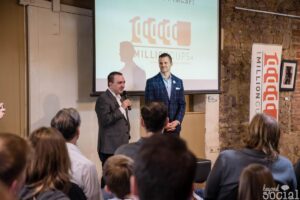 My primary contribution to South Dakota’s startup ecosystem is the creation of Startup Sioux Falls. I founded Startup Sioux Falls in 2019 as a community organization that would serve as a connecting point for small business owners and startup founders in the region. We held in-person events and built an online community of more than 7,500 members. That effort later merged with the Zeal Center for Entrepreneurship, creating the organization that we know as Startup Sioux Falls today. I served on the Startup Sioux Falls Board of Directors for many years and continue to be an advocate for the organization. MarketBeat was also the primary sponsor of Startup Sioux Falls’ new downtown headquarters.
My primary contribution to South Dakota’s startup ecosystem is the creation of Startup Sioux Falls. I founded Startup Sioux Falls in 2019 as a community organization that would serve as a connecting point for small business owners and startup founders in the region. We held in-person events and built an online community of more than 7,500 members. That effort later merged with the Zeal Center for Entrepreneurship, creating the organization that we know as Startup Sioux Falls today. I served on the Startup Sioux Falls Board of Directors for many years and continue to be an advocate for the organization. MarketBeat was also the primary sponsor of Startup Sioux Falls’ new downtown headquarters.
I have also worked to create new venture capital resources in the region. I was a major part of getting Falls Angel Fund off the ground, which is a series of community-based angel investment funds that have invested more than $5 million into early-stage, high-growth companies in the region. More recently, I launched Homegrown Capital with my business partner Tim Weelborg. We raised a $17.2 million fund to invest in technology startups in the Northern Plains region. Through Falls Angel Fund, Homegrown Capital, and my personal investments, I have invested in more than 75 startups, including Buffer, Bushel, Density, Dollar Shave Club, Lyft, Prismatic, and Wikia. I currently serve as a board member for two startups, Pitchly, and Prismatic. I also serve on the board of two economic-development non-profits, the Greater Sioux Falls Chamber of Commerce and the South Dakota Enterprise Institute.
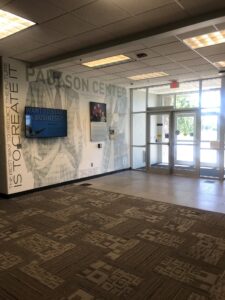 In 2020, I became the namesake of Dakota State University’s Paulson Center, which aims to accelerate student and faculty-led startup businesses. The center offers co-working space, mentorship resources, pitch competitions, and accelerator programs to students at DSU. My sincere hope is that the Paulson Center will give DSU’s next generation of entrepreneurs the resources and advice they need to build great South Dakota businesses.
In 2020, I became the namesake of Dakota State University’s Paulson Center, which aims to accelerate student and faculty-led startup businesses. The center offers co-working space, mentorship resources, pitch competitions, and accelerator programs to students at DSU. My sincere hope is that the Paulson Center will give DSU’s next generation of entrepreneurs the resources and advice they need to build great South Dakota businesses.
Finally, I have written several books that help people build online businesses and improve their personal finances. My most successful book is Email Marketing Demystified, which is now on its third edition. Email Marketing Demystified teaches people to build and maintain their email list and use it as a tool to generate revenue for their businesses. My other more recent book, Online Business from Scratch, provides a step-by-step path for anyone to build their own seven-figure internet business. You can find my books on Amazon here.
Supporting small businesses and startups can be a thankless endeavor given that most new companies fail within the first few years and the companies that do succeed often take a decade or more to show significant success. You always wish there were more immediate results, but you simply cannot will successful startups in existence. However, you can give every small business owner and startup founder the best chance they have to achieve their own entrepreneurial dreams. I hope I can make some small difference in the success of the next generation of startup founders in my region.
Deep Diving into Real Estate
Over the last several years, I have taken up an interest in commercial real estate development and investment. Commercial real-estate offers unique tax benefits and long-term opportunities for capital appreciation. It allows you to put larger dollars to work and often provides immediate cashflow. It also allows you to invest in your own community, creating places for people to live and work while growing your community at the same time. Sioux Falls is a steadily growing community, which leads me to believe commercial real estate will continue to be a solid investment for decades to come.
 Initially my participation in real estate was limited to private real estate funds and syndications. That changed a few years ago when I developed a relationship with Cresten Capital Holdings and Kevin Tupy. It started by putting 5% of the equity into a 70-unit apartment complex, but it escalated quickly from there. When COVID hit, Kevin and I were both sitting on cash and had the opportunity to buy up several multi-family apartment complexes when many other investors were playing defense. When acquisition opportunities dried up, we changed our focus to new development projects.
Initially my participation in real estate was limited to private real estate funds and syndications. That changed a few years ago when I developed a relationship with Cresten Capital Holdings and Kevin Tupy. It started by putting 5% of the equity into a 70-unit apartment complex, but it escalated quickly from there. When COVID hit, Kevin and I were both sitting on cash and had the opportunity to buy up several multi-family apartment complexes when many other investors were playing defense. When acquisition opportunities dried up, we changed our focus to new development projects.
As of early 2024, our combined portfolio consists of 35 commercial properties primarily consisting of multi-family apartment complexes, strip malls, and QSR restaurants. When our current projects under construction are complete, we will have more than 2,000 apartment units in South Dakota. We also own 14 retail properties, which include 10 Starbucks locations across the Midwest. We are continuing to grow aggressively and plan to make Cresten the premier real estate brand in our community.
Faith, Philanthropy, and Community Involvement
A major element of my Christian faith is a calling to give to others joyfully while also being the best steward possible of the resources God has entrusted to me. This means supporting my local church, with time, talent, and treasure. My faith calls me to give back, meet needs, and identify creative solutions to community problems. I also believe that business leaders should serve on non-profit boards and work on philanthropic projects for the common good. While I can’t serve on every board or support every non-profit, I help where I can.
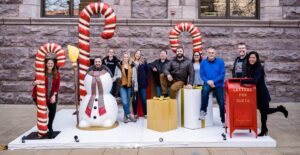 I also believe how non-profits operate and raise money in my community needs to evolve to meet today’s challenges. There is too much overlap of services among non-profits and not enough accountability with how donor dollars are spent. I have tried to be a thought leader on the topic of philanthropy and have experimented with creative fundraising projects such as the MarketBeat Burger, MarketBrew beer, and the MarketBeat Holiday Plaza. Over time, I hope to become a trusted voice in the Sioux Falls business community about what effective philanthropy looks like and how non-profits can operate with the same level of operational excellence that many for-profit businesses do.
I also believe how non-profits operate and raise money in my community needs to evolve to meet today’s challenges. There is too much overlap of services among non-profits and not enough accountability with how donor dollars are spent. I have tried to be a thought leader on the topic of philanthropy and have experimented with creative fundraising projects such as the MarketBeat Burger, MarketBrew beer, and the MarketBeat Holiday Plaza. Over time, I hope to become a trusted voice in the Sioux Falls business community about what effective philanthropy looks like and how non-profits can operate with the same level of operational excellence that many for-profit businesses do.
In terms of current volunteer work, I serve on the Board of Directors for the Greater Sioux Falls Chamber of Commerce and the South Dakota Enterprise Institute. I also serve on an advisory board for Augustana University. I have previously served on boards for March of Dimes, Sioux Falls Seminary (Kairos University), and Startup Sioux Falls. We (MarketBeat) also support a variety of annual events in Sioux Falls including Innovation Expo, Juneteenth, YPN Crossroads Summit, Sioux Falls CEO Summit, Sioux Falls Leadership Summit, and others.
Family First
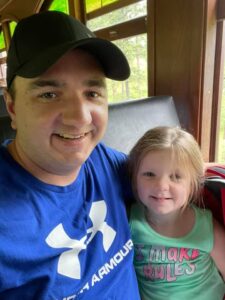 When I was growing up, my mom was a school librarian, and my dad was a police officer. This meant my dad often had to work unusual hours and sleep during the day. My dad demonstrated his love for our family by working hard, being a provider, and always doing whatever needed to be done. I have the luxury of working a more normal schedule, and I want to be around as much as I can during our kids’ formative years. I prioritize being at home with Karine, Micah, and Ady on nights and weekends, at the expense of being more involved in the community. I try to do an activity with my children every Saturday and take them on a father-daughter/son trip every summer. We are not big on organized activities but are big on quality time and creating experiences for our children.
When I was growing up, my mom was a school librarian, and my dad was a police officer. This meant my dad often had to work unusual hours and sleep during the day. My dad demonstrated his love for our family by working hard, being a provider, and always doing whatever needed to be done. I have the luxury of working a more normal schedule, and I want to be around as much as I can during our kids’ formative years. I prioritize being at home with Karine, Micah, and Ady on nights and weekends, at the expense of being more involved in the community. I try to do an activity with my children every Saturday and take them on a father-daughter/son trip every summer. We are not big on organized activities but are big on quality time and creating experiences for our children.
While business success is exciting, my primary hope is that my children turn out okay as fully functioning members of society. Both of our children have had challenges early on in their life. Micah was born ten weeks prematurely and weighed just 3 pounds and 1 ounce at birth. Adylin (Ady) has a rare medical condition that limits her gross motor skills and her ability to speak. I hope to pour as much love and energy as I can into our children while they are young.
The Future
As I write this biography, I am currently thirty-eight years old. With 30 years or more remaining in my career, I have a lot more that I hope to accomplish. I hope to grow MarketBeat into a $50m/year privately held business. I hope to redefine what effective philanthropy means in my community. I hope to build a real estate empire, as well as the largest venture capital firm in the region. I hope to run for elected office and be a key leader in my community. I hope to create and fund many community projects and amenities that all can enjoy. While I may not accomplish all these goals, I will always strive to do more and be more.
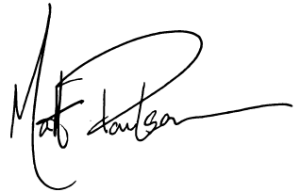
Matt Paulson
January 5th, 2024.
Connect with me on social media:
Feel free to contact me via email at [email protected].
